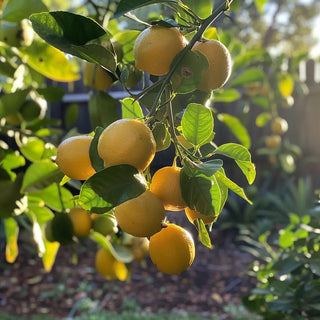
With the right site and preparation, Meyer Lemon Trees establish easily and reward you with fragrant blooms and delicious fruit.
How to plant Meyer Lemon Trees?
To plant a Meyer Lemon Tree, select a well-draining site with full sun exposure to ensure optimal fruit production. Begin by digging a hole twice as wide and as deep as the root ball, gently loosening the roots before placing it in the hole. Fill in the space with soil, water thoroughly, and mulch around the base to retain moisture.
When to plant Meyer Lemon Trees?
The best time to plant Meyer Lemon Trees is in the spring after the last frost, allowing the tree ample time to establish itself in the warm weather. However, in regions with mild winters, planting can occur in the fall. Container planting is a viable option year-round, provided the environment remains warm and sunny indoors during colder months.
How far apart should you plant Meyer Lemon Trees?
When planting multiple Meyer Lemon Trees, space them approximately 8 to 10 feet apart to ensure proper air circulation and sunlight access. This spacing minimizes the risk of fungal diseases and promotes healthy growth. Consider nearby structures or other plants that may cast shadows or compete for resources, as they can impact the tree's vitality and fruit production.
With the right site and preparation, Meyer Lemon Trees establish easily and reward you with fragrant blooms and delicious fruit.
How to plant Meyer Lemon Trees?
To plant a Meyer Lemon Tree, select a well-draining site with full sun exposure to ensure optimal fruit production. Begin by digging a hole twice as wide and as deep as the root ball, gently loosening the roots before placing it in the hole. Fill in the space with soil, water thoroughly, and mulch around the base to retain moisture.
When to plant Meyer Lemon Trees?
The best time to plant Meyer Lemon Trees is in the spring after the last frost, allowing the tree ample time to establish itself in the warm weather. However, in regions with mild winters, planting can occur in the fall. Container planting is a viable option year-round, provided the environment remains warm and sunny indoors during colder months.
How far apart should you plant Meyer Lemon Trees?
When planting multiple Meyer Lemon Trees, space them approximately 8 to 10 feet apart to ensure proper air circulation and sunlight access. This spacing minimizes the risk of fungal diseases and promotes healthy growth. Consider nearby structures or other plants that may cast shadows or compete for resources, as they can impact the tree's vitality and fruit production.
